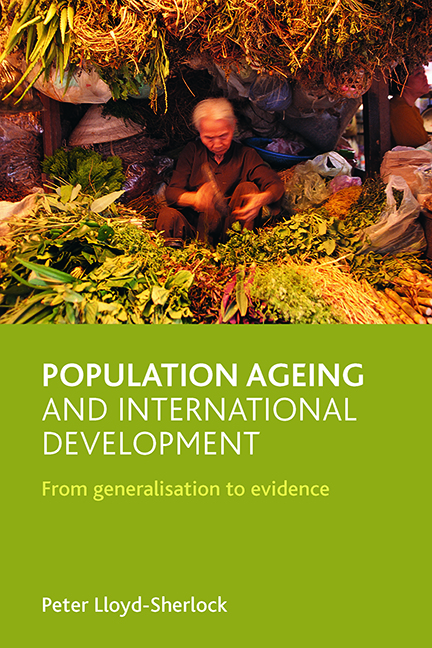Book contents
- Frontmatter
- Contents
- List of abbreviations
- Acknowledgements
- Notes on the author
- Introduction
- one International development and population ageing
- two Experiencing later life in contexts of development
- three Older people, pensions and development
- four Population ageing and health
- five Later life and social relations: family, migration and care
- six Ageing and development in South Africa
- seven Ageing and development in Argentina
- eight Ageing and development in India
- nine Conclusions and overview
- References
four - Population ageing and health
Published online by Cambridge University Press: 15 July 2022
- Frontmatter
- Contents
- List of abbreviations
- Acknowledgements
- Notes on the author
- Introduction
- one International development and population ageing
- two Experiencing later life in contexts of development
- three Older people, pensions and development
- four Population ageing and health
- five Later life and social relations: family, migration and care
- six Ageing and development in South Africa
- seven Ageing and development in Argentina
- eight Ageing and development in India
- nine Conclusions and overview
- References
Summary
Introduction
Experiences of health and illness are central to older people's wellbeing and influence how population ageing affects development. Good health may enable older people to continue in employment, facilitate their social networks and enhance their economic and emotional resilience. An old age characterised by high rates of disease and illness increases the potential economic and social ‘burden’ of older people and reduces their quality of life. While the risk of some diseases increases with old age, overall patterns of health vary markedly across older populations. For example, a 60-year-old woman in Japan can expect on average another 22 years of healthy life, compared with only 10 for her counterpart in Senegal (WHO, 2004a). This means that the relationship between later life and health status should not be viewed as inevitable. To some extent, national differences in healthy life expectancy are largely a consequence of general gaps in prosperity and development. However, this chapter argues that it is possible to significantly improve the health of older people even in contexts of relative poverty. It draws attention to the importance of affordable interventions based on promoting lifelong good health. Currently, most healthcare systems give little attention to such interventions, preferring to focus on advanced, hospital-based health services. As such, this chapter argues that population ageing requires a wholesale reorientation of health policy in developing countries, and that this would be of benefit to young and old.
This chapter begins with a discussion of individual experiences of biological ageing and functioning. It then explores general patterns of development and population health, before focusing more narrowly on patterns of health and disease among older people. This is followed by an account of the evolution of modern healthcare systems in developed and developing countries, including the provision of services that are of specific relevance to older people. This discussion also considers the extent to which older people are able to access health services and patterns of inequality among older people. The chapter closes with two individual case studies of older people's experiences of health and illness.
Individual ageing, health and functioning
Any discussion of health and later life runs the risk of projecting a gloomy and negative view of old age.
- Type
- Chapter
- Information
- Population Ageing and International DevelopmentFrom Generalisation to Evidence, pp. 91 - 116Publisher: Bristol University PressPrint publication year: 2010



